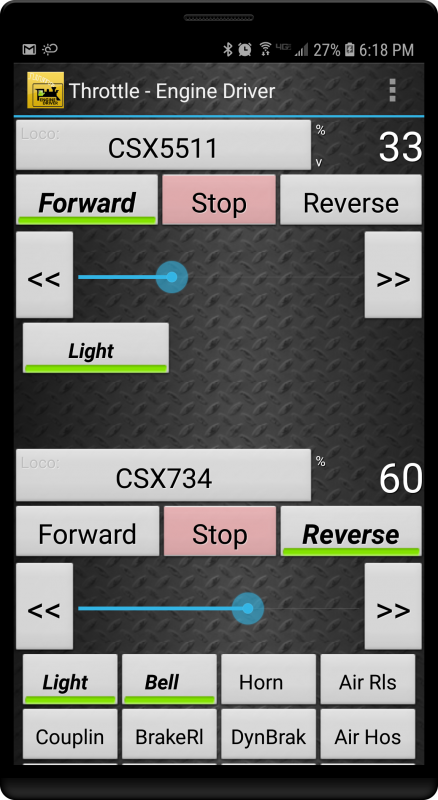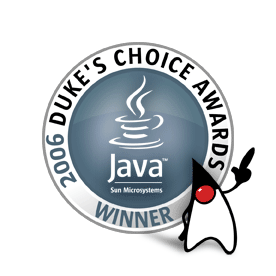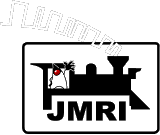- DecoderPro®
- A great tool for programming decoders, simplifying the job of configuring DCC decoders from your computer
- PanelPro™
- Design and Operate control panels that reflect the real-time state of your railroad and let you control it
- DispatcherPro™
- A system for Dispatching, grouping your Roster and Throttles
- OperationsPro™
- Build Trains from your Roster and print Train Manifests that detail the work your train crews will perform
- SoundPro™
- A set of tools for using Audio with JMRI
- Cool Uses
- People have used JMRI to do some great things for the model railroad community.
Our Gallery page highlights some of these.
Also, there are many apps with JMRI connections. - Tools
- JMRI tools for working with your layout:
- Common Tools:
- Blocks:
- Routing and Control:
- Other:
- System-specific...
- Web server tools...
- Layout Automation
- Use JMRI to automate parts of your layout and operations:
- Supported Hardware
- Devices, command stations, networks, and protocols:
- Anyma DMX
- Arduinos
- Atlas Commander
- Bachrus
- BiDiB
- CAN Bus Networks
- CBUS®
- C/MRI
- CTI Electronics (Acela)
- CVP EasyDCC
- Dcc4Pc
- DCC-EX EX-CommandStation
- DCC++
- DCC Specialities
- Digi XBee
- Digikeijs / YAMORC
- Digitrax
- DMX 512 (Powerline)
- ESU ECoS
- Fleischmann
- Hornby
- Insteon (Powerline)
- LCC
- Lenz
- Lionel TMCC
- LocoNet
- Maple Systems
- Märklin CS2
- MERG
- Modbus
- MQTT
- MRC
- NAC Services RPS
- NCE
- Oak Tree Systems
- OpenDCC
- OpenLCB
- Pi Engineering RailDriver
- Powerline
- Protrak Grapevine
- QSI Quantum Programmer
- Raspberry Pi
- RFID Readers
- Roco
- SPROG DCC
- SPROG DCC Generation 5
- SRCP server
- TAMS Master Control
- TracTronics SECSI
- Uhlenbrock Intellibox
- Viessmann Commander
- Wangrow System One
- WiFi Throttles
- X10 (Powerline)
- XPressNet
- Zimo MX-1
- ZTC Controls
- JMRI Setup and Installation
- JMRI environments...
Downloadable Releases
JMRI 5.12 Production Release
JMRI 5.12 is recommended for new users. It is the most recent stable production release.
For more information, see the JMRI 5.12 Release Note, which also contains the download links.
JMRI 5.13.6 Test Release
This is the next in a series working toward the next JMRI production release 5.14 probably in December 2025.
For more information on this test release, please read the JMRI 5.13.6 Release Note, which also contains the download links.
Release 5.12 is the current "production" release, recommended for first-time users.JMRI 4.26 Production Release
JMRI 4.26 is recommended for JMRI users with computers that can only run Java 8; later releases require Java 11 or later.
For more information, see the JMRI 4.26 Release Note, which also contains the download links.
JMRI 3.10.1 Production Release
JMRI 3.10.1 is recommended for JMRI users with computers that can only run Java 1.6.
For more information, see the JMRI 3.10.1 Release Note, which also contains the download links.
JMRI 2.14.1 Production Release
JMRI 2.14.1 is recommended for JMRI users with computers that can only run Java 1.5.
For more information, see the JMRI 2.14.1 Release Note, which also contains the download links.
JMRI shirts are available!
-

- Daylight Sales now has three kinds of shirts available with the JMRI logo embroidered on them.
JMRI at NMRA 2025 Convention
-

-
There are multiple
JMRI clinics planned at the
NMRA 2025 National Convention
in Novi Michigan, along with our traditional user get-together.
NMRA 2025 Clinic summary
JMRI at 25 and 10,000 updates
-

-
JMRI is celebrating its 25th birthday! It first started to come together in October of 1999. It's come a long way since!
We're also celebrating the 10,000 contributed update to the JMRI source code. Thanks to all the people who've worked on JMRI over the years.
For more information, see here.
MR SLAM Formatter: Another "JMRI Connections" Application
-

- Tim Mann has created "Model Railroad Switch List and Manifest Formatter (MR SLAM Formatter)" as an additional way to create custom railroad paperwork from JMRI information. For more info, see our Community Connections page or go directly to the program's website
New "How To" Explanations for Operations
-

- There's a new series of introductory "How To" explanations for JMRI Operations. These provide step-by-step instructions for doing the first things needed to get started with Operations.
Check Out the "JMRI Clinics" page
-

-
Several users have contributed their clinics for our
Clinics page. There are both conventional handout
and slides clinics, and also some neat interactive clinics for DecoderPro®
and PanelPro™.
Some JMRI clinics from past NMRA national and other conventions are also included.
Additional Applications with JMRI Connections
-

- Hobbyists have created applications that work with JMRI to provide extra capabilities. In addition, some commercial vendors have created applications that work with, add data to, or take data from JMRI. See the community/connections directory for a list and links. New applications can be added at any time!
Your Smart Phone as a Throttle
-

-
You can use your iPhone, iPad or Android phone as a throttle with JMRI.
After you download and install a program onto your phone, you can connect it wirelessly to your computer running JMRI, which in turn will run your layout. Imagine friends visiting your layout and running trains from their mobile device, without having to bring throttles.
For more information, see the feature page.
Run Locos in a Browser
-
.png)
- You can control your layout directly from your computer, smartphone or tablet, without the need to download and install any application. The current web browsers running on these devices are able to manage the resources and features needed to replace physical throttles. Just start the JMRI Web Server on your JMRI computer, open http://<your JMRI server>/web/webThrottle.html and enjoy it. For more information, please visit the webThrottle - Web control for locos, panels, turnouts and routes page.
JMRI on Raspberry Pi
-

- The Raspberry Pi is becoming increasingly popular as a small and cheap computer. JMRI will operate under the Raspbian operating system (Debian version of Linux). Follow the installation instructions..
Online Help
-

- The JMRI applications have a built-in help system. It has lots of information, including overviews and window-specific information. The pages are simple HTML, and users are encouraged to add missing information. The Help information is available online via either the Index or Table of Contents.
Decoder ID pages

-
Our "Decoder ID" pages provide easy access to all sorts of information
about decoders.
They are automatically created from the current DecoderPro definitions.
Contribute more information to our decoder definitions, and help these pages become even more useful!
KAM Dispute Ends!
-

-
JMRI is an informal open-source software group.
We do this for the joy of model railroading, and don't produce anything for profit.
One of our members has spent four years in the Federal Courts defending our right to continue against an individual who has attacked us with bogus patent threats, cybersquatting, copyright infringement and other illegal acts.
We are extremely pleased to announce that this case has been settled. The agreement ends the dispute, and gives everybody involved a way to move forward. This is a victory for JMRI and open-source software in general.
JMRI wins Duke's Choice Award
-

-
Sun Microsystems (since 2010 part
of Oracle)
has awarded JMRI a
2006 Duke's Choice award.
Also called a "Dukie", this award is given annually to "some of the most clever, practical, and inspirational Java technology applications on the planet". The award was presented at the annual JavaOne conference on May 14th by James Gosling.JMRI won for its community, its use of Java technology to empower people all over the world to contribute, and for the impact it's had.

